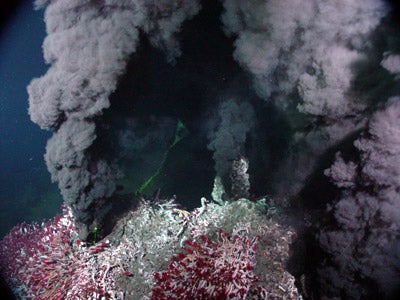'Semi-infinite' trove of rare-earth metals found in Japanese waters
Discovery of elements used to manufacture mobile phones and electric cars could keep world supplied for hundreds of years

Your support helps us to tell the story
From reproductive rights to climate change to Big Tech, The Independent is on the ground when the story is developing. Whether it's investigating the financials of Elon Musk's pro-Trump PAC or producing our latest documentary, 'The A Word', which shines a light on the American women fighting for reproductive rights, we know how important it is to parse out the facts from the messaging.
At such a critical moment in US history, we need reporters on the ground. Your donation allows us to keep sending journalists to speak to both sides of the story.
The Independent is trusted by Americans across the entire political spectrum. And unlike many other quality news outlets, we choose not to lock Americans out of our reporting and analysis with paywalls. We believe quality journalism should be available to everyone, paid for by those who can afford it.
Your support makes all the difference.Scientists have found rare-earth metals required to produce high-tech products ranging from mobile phones to electric cars, in Japanese waters.
It is estimated the newly discovered trove could supply demand on a “semi-infinite” basis.
A research team comprising representatives from universities, businesses and government institutions conducted a survey of the waters around Minamitorishima Island.
On the sea floor, they found the mud was rich in “some of the most critically important elements in the modern society”, including rare earth elements such as terbium and dysprosium.
From their initial discovery, they extrapolated that a 2,500-square kilometre region off the southern Japanese island could contain 16 million tons of the valuable elements.
In a study published in the journal Scientific Reports, the researchers suggested their finding "has the potential to supply these metals on a semi-infinite basis to the world”.
Taking dysprosium – an element use to make components in nuclear reactors – as an example, the authors of the study suggested the volume they had discovered could potentially last for 730 years.
As it stands, the world is heavily reliant on China for rare earth metals.
The discovery could therefore prove highly beneficial for Japan, which has faced serious supply shortages in the past when China limited exports of the valuable resources.
“Potential risks of supply shortages for critical metals including rare-earth elements and yttrium (REY) have spurred great interest in commercial mining of deep-sea mineral resources,” the authors of the study.
Deep sea mining has become an increasingly appealing prospect as nations have come to realise the wealth of valuable resources on the ocean floor.
Hydrothermal vents and metallic nodules at the bottom of the ocean are rich in valuable metals including gold, copper and manganese.
However, efforts so far have been limited by the lack of capacity. Only recently has technology reached a stage where extracting these materials is a viable commercial option.
Environmental groups have said that mining operations have the potential to destroy marine ecosystems – many of which are still poorly understood.
The International Seabed Authority, which regulates the sea floor within international waters, is currently in the process of introducing rules to prevent areas of scientific or ecological interest being mined.
Join our commenting forum
Join thought-provoking conversations, follow other Independent readers and see their replies
Comments